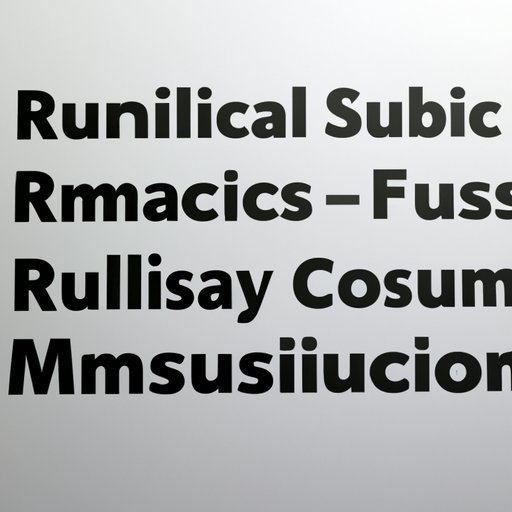Introduction
The debate around whether it is a sin to listen to music with cursing has been ongoing for many years. While there is no definitive answer, it is important to thoroughly examine the issue in order to come to an informed decision. In this article, we will explore the Biblical perspective on this issue, as well as the views of the Catholic Church and other religions. We will then discuss the potential impacts of listening to explicit music on our mental health and relationships, before providing an overview of the arguments for and against listening to music with profanity.
Examining the Biblical Perspective on Listening to Music with Cursing
When considering whether it is a sin to listen to music with cursing, it is important to look at what the Bible says about profanity and music. In the Old Testament, the Bible states that “you shall not take the name of the Lord your God in vain” (Exodus 20:7). This suggests that using profane language is a sin in itself, regardless of the context in which it is used. However, the Bible does not explicitly state that listening to music with explicit lyrics is a sin. Instead, it provides general guidance about avoiding profanity, which could be interpreted to mean that listening to music with explicit lyrics should be avoided.
In addition to this, the Bible also speaks of the importance of guarding our hearts and minds from evil influences. In Philippians 4:8, Paul instructs us to “whatever things are true, whatever things are noble, whatever things are just, whatever things are pure, whatever things are lovely, whatever things are of good report, if there is any virtue and if there is anything praiseworthy—meditate on these things.” This suggests that we should be mindful of the content we allow into our minds, and be selective in the type of music we choose to listen to.
Exploring the Pros and Cons of Hearing Music with Profanity
When deciding whether or not it is a sin to listen to music with cursing, it is important to consider both the benefits and drawbacks of hearing such music. On the one hand, listening to music with explicit lyrics can be cathartic and provide comfort to those who are struggling with difficult emotions. For some, listening to music with explicit lyrics offers an escape from their problems and helps them to process their feelings. In addition, some argue that listening to explicit music can help to build empathy, as it allows us to better understand the struggles of others.
On the other hand, there are some potential drawbacks to hearing music with explicit lyrics. For example, it can be difficult to distinguish between the artistic expression being conveyed in the music and the messages of hate and violence that can sometimes be found in the lyrics. Furthermore, some argue that listening to explicit music can desensitize us to profanity, leading us to become more comfortable with using such language in our own lives.

The Impact of Listening to Music with Explicit Lyrics
It is also important to consider the potential impact of listening to music with explicit lyrics on our mental health and relationships. Research has shown that hearing explicit music can have a negative effect on our mood, as it can lead to increased feelings of aggression and depression. In addition, it can be difficult to communicate with others if we are constantly exposed to explicit music, as it may make it harder for us to relate to people who do not share our musical tastes.
Furthermore, listening to explicit music can have an impact on our faith and values. When we are exposed to profanity and other negative messages in music, it can be difficult to maintain strong moral convictions. If we listen to music with explicit lyrics on a regular basis, it can be easy to become desensitized to the message being conveyed, making it harder to stay in tune with our spiritual beliefs.
What Does the Catholic Church Say About Listening to Music with Cursing?
The Catholic Church has a long history of teaching about the importance of music and its role in worship. The Church believes that all forms of music should be used to glorify God, and that those who listen to music should be aware of the potential moral implications of doing so. In terms of explicit music, the Catholic Church teaches that it is not appropriate to use profane language in song, as it can be offensive to believers and non-believers alike.
The Church also speaks of the importance of using discernment when it comes to listening to music. Discernment involves being mindful of the content we are consuming and determining whether or not it is beneficial to our spiritual growth. Therefore, the Church encourages believers to think critically about the music they are listening to and assess whether or not it is helping them to maintain their faith.

Understanding the Views of Different Religions on Music with Cursing
In addition to the teachings of the Catholic Church, it is also important to consider the views of other religions on this issue. While some religions may view listening to music with explicit lyrics as a sin, others may have a more relaxed attitude towards it. For instance, some Buddhists may believe that it is acceptable to listen to music with profanity, as long as it does not lead to immoral behavior.
It is also important to remember that every person is different, and therefore has different opinions and beliefs on this topic. Therefore, it is important to respect the views of others and take their opinions into consideration when deciding whether or not to listen to music with explicit lyrics.

An Overview of the Arguments for and Against Listening to Music with Profanity
When considering whether it is a sin to listen to music with cursing, it is important to consider both sides of the argument. Those in favor of listening to explicit music often point to the potential benefits mentioned earlier, such as catharsis and increased empathy. They also argue that it is important to allow freedom of expression, and that censoring music would be a violation of this right.
On the other hand, those who are against listening to explicit music often cite the potential effects on mental health and relationships, as well as the potential for desensitization to profanity. They also point to the importance of discerning what we allow into our minds, and argue that listening to explicit music can lead to a lack of moral integrity.
Conclusion
In conclusion, it is clear that the question of whether it is a sin to listen to music with cursing is complex and subjective. While the Bible provides general guidance on avoiding profanity, it does not explicitly state that listening to explicit music is a sin. Furthermore, different religious perspectives can influence our views on this issue, and it is important to respect the beliefs of others. Ultimately, it is up to the individual to decide whether or not they feel comfortable listening to music with explicit lyrics, taking into account the potential benefits and drawbacks of doing so.
(Note: Is this article not meeting your expectations? Do you have knowledge or insights to share? Unlock new opportunities and expand your reach by joining our authors team. Click Registration to join us and share your expertise with our readers.)
